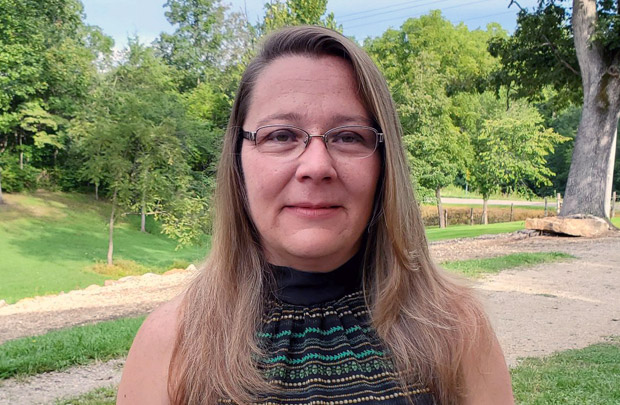
Karla Adams is a children’s division worker in Missouri. A mother who is fostering a daughter she plans to adopt suggested that we feature Karla as an Outstanding Caseworker. The mother wrote:
“Karla has helped us be the best foster parents we can be to our daughter until our adoption happens… She takes time to explain everything to our child, who has endless questions that are extremely difficult to answer, and never hesitates to keep us informed with a text or talk with us late at night or early in the mornings—even if it’s just for us to vent or share a back-to-school picture we can’t post but are very proud of! Karla is truly an angel.”
What did you think when you read these words of praise for your work?
My job is to support foster families like this one and birth families. I’m the mediator, basically, and I don’t choose sides. Which is hard! The job can be emotionally stressful and make you feel like you are not doing enough. So it’s very reassuring to hear that parents I work with appreciate me.
The mother said you helped answer their daughter’s difficult questions. What was your approach?
This little girl is young, but wise beyond her years. She’s in second grade, but intellectually, it’s like she’s ready for college. She has a lot of questions about why her birth parents do the things they do.
My approach in this situation—and whenever possible—is to tell children the truth. I really believe that being honest helps them, especially if they are in counseling and their therapist can help them process what they’ve discussed with us.As a caseworker, there are good days, and there are bad days. But there are seldom boring days! Share on X
What attracted you to working with children and families?
Actually, I wasn’t attracted to this work! Because I really didn’t know that it existed.
Before I took this job, I’d lived on military bases for 23 years because my husband was in the Army. It was a safe, sheltered existence. I never heard about kids being removed from their parents. If there were concerns with families, it was taken care of internally.
When my husband retired, becoming part of the civilian world was almost culture shock. Even though I’d been born and raised in United States, I’d never seen this side of it until I took my first job with the county seven years ago.
What keeps you doing it?
The kids. I get too attached. And now that I know that this need exists—that so many children need someone on their side—I can’t imagine walking away from them.
And I work with great people who are very supportive. There are tough days, and being able to go back and talk with my colleagues make all the difference.
What is your advice to workers who are new to the field?
Try not to take anything personally. Birth parents can be angry and direct it at you. But as you work with them, they’ll realize that you are not the enemy and you are trying to help them reunify with their kids.
As a caseworker, there are good days, and there are bad days. But there are seldom boring days! Because every day is different, and you never know what is going to happen. You may set aside a day to finish paperwork and end up driving across the county to meet with a family. Being flexible is key.
What is your advice to families looking into foster care?
One of the main things to realize is that we are all working toward reunification first and trying our hardest to help families stay together.
As a foster parent, there will be days you get frustrated. When something happens or you need help, call your worker right away. We are there to support you.